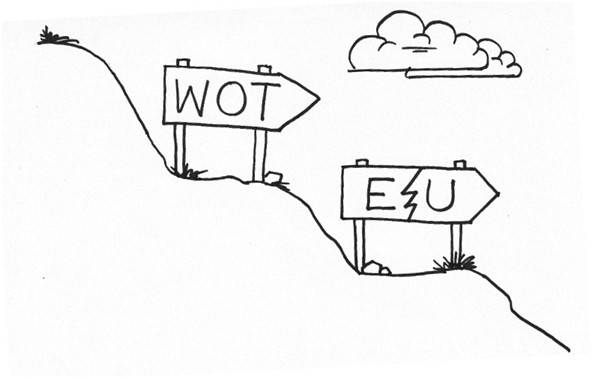
Existential threat
Sir,
When I was in Germany, my friends there used to have a debate over the future of the European Union. Now, when Brexit has become a reality, my friends who live there often tell me I was right. I had predicted, surprisingly successfully, that Britain would be the first to leave the EU. My prediction was not based on any occult knowledge; I had read Henry Kissinger’s forecast for the European Union’s future. He warned America of the emerging threat of the European Union and the Euro, which “Washington shall have to confront, after tackling terrorism.” In fact the US is more threatened by the German-led independent economy and indigenous policies under the iron lady leadership.
The referendum has turned the table. On the day of the referendum, the pound plummeted to a 30-year low; the Japanese stock market crashed 8 percent and suspended trading; talks began over another Scottish independence referendum as well as an Irish reunification referendum; far-right nationalists across Europe started calling for referendums to quit the EU; in two hours, the UK economy lost over £255b, the equivalent of 40 years’ worth of EU contribution. To top it all off, David Cameron resigned.
Towards the middle of this ongoing century, one has to see the sea of changes in dynamics across Europe and America, and one has to hence say that the EU is facing a major existential threat.
Lajja Laraib,
Sialkot.
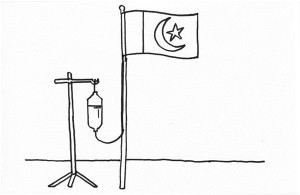
Fragile state
Sir,
It is an indictment of Pakistan’s numerous state institutions, its establishment and political elite who have been at the helm during the past five decades that this country today is ranked at number 14 amongst the most fragile states of the world. All other countries worse than Pakistan are in Africa, except Afghanistan, which stands at number eight, the worst being South Sudan.
This ranking is based on 12 social, economic and political indicators to analyze how wars, peace accords, environmental calamities and political instability have pushed them to the brink of collapse. Pakistan, according to this study, faces worsening trends in demographic pressures, refugees and internally displaced persons, brain drain, poor public services and increasing external pressures.
Although Pakistan has shown improvement since the launch of Operation Zarb-e-Azb under Gen Raheel, there is a lot that needs to be done. The loopholes in our border security, vast coastal belt and airports for smuggling of weapons, flight of black money and illegal entry of aliens must be plugged.
The basic purpose of every institution of state is to serve the people and not vice versa. Unfortunately, ever since Pakistan’s sovereignty has begun being compromised and the security of citizens and national economy has been on a decline, the perks and privileges of paid servants of state have gone berserk.
The “conflicts of interest” of paid and elected public officeholders, involved in commercial ventures and other irregularities from which they derive more financial benefits than their salaries and legal emoluments, has adversely impacted their professional competence and contributed to massive corruption and money laundering. These loopholes are exploited to finance and arm terrorism and boost flight of capital and brain drain. Institutional accountability should only be applicable for professional misconduct and negligence, but not for criminal and financial crimes and irregularities such as aiding or abetting smuggling, illegal occupation of private or state land, tax evasion, and split loyalties, which adversely impact socio economic development.
Ali Malik,
Lahore.
Imminent danger
Sir,
I beg to bring to your notice the following facts. The road running from Clifton Colony Ghati towards Al-hamd Colony main straight link road Street No.3 behind Wahdat colony Lahore is an important thoroughfare in this locality. Hundreds of people travel either on foot or by motorcycles along this road. Also, handcarts ply along with school Vanv, private cars, auto rickshaw and taxis. At present, repair work on this road was started last month, but until now, only 30% of the road has been repaired and the road now stands in need of urgent repairs, otherwise accidents will be a routine matter when the rainy season sets in.
If repairs are not done immediately, the public will be put in danger. It is imperative that the authorities take notice of this issue and rectify this dangerous situation at the earliest.
Adnan Zafar,
Lahore.
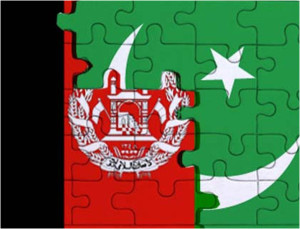
Large-scale neglect
Sir,
Balochistan is the largest province of Pakistan by geographical area, which is constituting approximately 43% of total area of Pakistan. In the 1998 census, Balochistan had a population of roughly 6.6 million. It is Pakistan’s largest province as well as it’s poorest and least populated. But Balochistan is rich in mineral resources and it is the second biggest gas supplier after Sindh. A large number of Baloch moved to Quetta after it became the capital of Balochistan in 1970. Balochistan suffers owing to the lack of education and health facilities, as the government does not pay attention to these issues. Most schools are in shambles. Moreover, whatever schools and colleges there are in the province, they are being destroyed in the absence of teachers. This has rendered approximately more than 50,000 students out of school, leaving them with shattered dreams. They don’t have enough money to seek admissions in private schools, and in some areas, there are no schools at all. The federal government should intervene in the matter and streamline the education system in Balochistan at the earliest.
Munaj Gul Muhammad,
Quetta.
Forgotten friend
Sir,
Zalmay Khalilzad, an Afghan diplomat in the US who played a key role in America’s policy towards Afghanistan, Pakistan and Iraq after the 9/11 terrorist attacks, has advised the US government to adopt a policy of “total isolation” against Pakistan and send Islamabad a strong signal to face the prospect of becoming a “second North Korea” if it continues “destabilizing Afghanistan” by supporting the Taliban and the Haqqani network. He asked the US government to suspend all assistance to Pakistan and “move towards isolating Pakistan internationally”.
Zalmay’s tirade came amid reports of America’s ties with Pakistan going sour. Indian Prime Minister Modi, in his address to the US Congress, urged America to isolate Pakistan. India is also being given enhanced role in Afghanistan since the Chabahar corridor has been given to Indian control. Richard Oslon, the US envoy for Afghanistan and Pakistan, has on record admitted that various Indian consulates are active along the Pakistan border in Afghanistan.
It is Pakistan that extended all kinds of help, helped America in the cold war against Russia and pulled Americans from all sorts of troubled waters. Tom Harkin, a senior US senator, rightly said, “Cold war or hot war, in every war they (Pakistanis) stood by the Americans. If it was not for Pakistan, I dare say the cold war would not have been won.”
Hamza Ali,
Islamabad.
Dhaka carnage
Sir,
The recent killings of 20 hostages in a restaurant packed with foreigners in Dhaka are being strongly condemned by the whole world. The Indian media is trying to imply that Pakistan is behind these attacks, throwing a range of baseless allegations. Our Foreign Office has rejected the allegations and condemned terrorism in all its forms and manifestations.
The expansion of terrorism may be seen everywhere in the world from Dhaka to Baghdad, Saudi Arabia to Syria and Europe to America. Pakistan had remained one of the biggest victims of terrorism. We cannot eradicate terrorism by just blaming other countries. There is a dire need for international cooperation to fight the menace of terrorism.
Mansoor Ahmed,
Faisalabad.
No estate
Sir,
Reforms on the sale and purchase of real estate may be aimed at discouraging black money circulation, but frankly these would do little justice to so-called non-filers (all pay indirect taxes, only filers reclaim them), who mainly belong to the low or moderate income middle class.
These reforms will only benefit the rich.
How will a common person buy a house on market price and pay transfer levies on it, particularly if he’s a non-filer or has pooled up some money to buy a house from his other family members?
Wouldn’t this measure induce higher real estate prices and rents? Then how would a prospective real estate buyer justify the source of his income if he has gathered it over the years or taken a loan from his relatives? It seems impossible that our new generation would now be able to buy a house of their own. Bringing non-filers into the tax net is desirable but not in the existing system. It was imperative to bring reforms in the income tax system rather than penalising citizens under the cover of such real estate reforms, which will serve only affluent investors and deprive commoners from buying and living in houses in good areas. This will again result in discrimination between haves and have-nots, resulting in social turmoil.
Mazhar Butt,
Karachi.
Black day
Sir,
On July 5, 1977 Pakistan plunged into the darkest era of its history. A democratically elected government got overthrown by one of the worst dictators in recent times. The Pakistani nation was hostage to a group who mutilated Pakistani society to unrecognizable levels. Anyone who lived in pre-Zia era Pakistan can never recognise Pakistan of the present day. At the behest of foreign imperialists, Zia destroyed the very fabric of Pakistani society. The concept of Pakistani nationhood got first uprooted and then replanted, watered with extremism and fertilized. The plant grew up and now it’s a tree, bearing fruits of killings, intolerance, drugs, illegal arms and so forth. It is ironic that the generation that never played any role in destroying Pakistani society is now paying the price with their blood to extinguish the fire lit by Zia and his cohorts. Opportunism driven pro-establishment politicians of a larger province embraced Zia and conspired to transform society through strings of religious seminaries, the nexus then interpolated with education systems and defiled young minds with a manufactured history. The distortion was so complete that after so many years in post-Zia Pakistan, the confusion about the creation of Pakistan is widespread. Younger Pakistanis of today are not sure what makes a Pakistani. What comes first, faith or state? Pakistan should declare July 5 as “Black day”. Bravo to those law enforcers who are giving their lives today to restore sanity in Pakistani society. Optimism demands that we should keep faith in our country. There will be a dawn of peace and harmony.
Malik Atif Mahmood Majoka,
Australia.
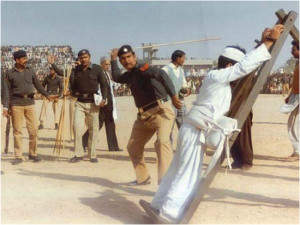
Wake up Turkey
Sir
After the Arab Spring started in the Middle East in 2011, Turkey was seen as an inspiration for aspiring democracies in the region. The country has a democratic government that leaned towards political Islam, but did so in a seemingly moderate way, is a member of NATO, a growing economic powerhouse, and an island of stability in the region. But the recent attack on Atatürk International Airport clearly indicates that Turkey is slowly moving in the direction of becoming another chaotic country in the region. ISIS first began targeting people it thought were Kurd sympathizers, whom they were fighting against in Syria. Later, it turned to tourists in Turkey. Then ISIS attacked Turkey’s security forces. The next step was to target Turkey’s civilian population. The latest attack at Istanbul’s Atatürk International Airport demonstrates that ISIS regards the Turkish government and people in their entirety as enemies. By hitting its airport, ISIS also struck at Turkey’s pride, damaging Istanbul’s status as a major international hub. The airport bombing was a wake-up call for Turkey that ISIS was no longer just its neighbour’s problem. ISIS is refocusing its strategy in Turkey towards destabilizing the state.
Turkey’s ISIS problems originated from its Syria policy. For the early part of the Syrian civil war, Turkey was focused on trying to oust long-time foe President Bashar al-Assad. It offered its support to opposition groups, some of whom became increasingly radical over time. When ISIS, the most extreme and effective of them all, established itself as a brutal force, instead of condemning them, Turkey’s ruling Justice and Development Party (AKP) kept quiet. Turkey instead tolerated ISIS as a vector to apply indirect pressure on Syrian President Bashar al-Assad and hasten the overthrow of his regime by opposition groups supported by Turkey. ISIS also provided Turkey with a means to contain the Syrian Kurdish YPG, which Turkey views as a major threat due to its affiliation with secessionist agenda of the outlawed Turkey’s Kurdistan Workers’ Party (PKK). In the early phase of the Syrian civil war, Turkish officials allowed great quantities of arms and thousands of extremist foreign fighters to pass through its border into Syria. For years, Islamic State fighters in the war next door in Syria had effectively used Turkey as a rear base. The situation began to deteriorate when Ankara made the decision to allow the US-led coalition use of its army base to conduct air strikes against ISIS. The penetration of Turkey by ISIS is a legacy of Ankara’s misguided open door policy on the Syrian border.
While Turkey classifies ISIS as a terrorist group, it was late to seal its borders to militants crossing from Turkey into Syria, focusing instead on Kurdish militants and the regime of Bashar al-Assad as the primary threats to its national security. Turkey’s border policies are no longer merely fuelling the war in Syria. They are coming back to haunt Turkey, too. ISIS has well-established networks in Turkey, with clusters of people based in Istanbul, Ankara, Konya, Adana, Izmir, ?anliurfa and the Gaziantep. Many analysts now believe that some elements within Turkey’s government stomached, or even fostered, extremist groups in Syria that tallied with their beliefs, creating a domestic environment in which IS could grow.
Turks should realise that the biggest beneficiary of the resumption of violence between Turkey and the PKK is ISIS, which is the top national threat for Turkey now. The country is in a dire situation, and needs to get its act together and fight the real terrorists while holding talks with Kurds.
Manish Rai,
Mumbai.
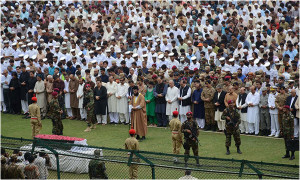
Undignified
Sir,
Is this any way to say a funeral prayer for a man of peace and love, guarded by armed commandos? Abdul Sattar Edhi deserved a quiet, dignified family burial or an awami burial, amidst those he served to his last breath. His wife and son ought to have refused this undignified exit.
Tariq Jamal,
Lahore.

